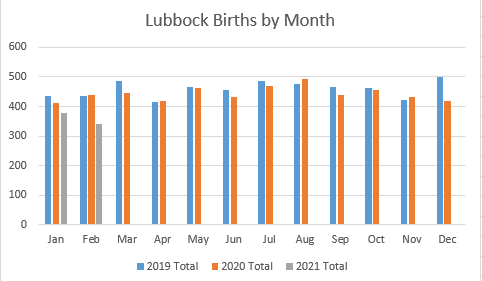Birth Dearth Nine Months Following COVID Lockdowns

The first cases of Covid-19 in the United States occurred on February 29, 2020. The Texas lockdown was ordered by the governor on March 31, 2020. The effects on births of these events would be expected nine months later, so December 2020 for effects from news about the initial outbreak, and January 2021 for effects from lockdowns.
Figure 1 illustrates births in Lubbock County, Texas. Lubbock County is served by two hospitals: University Medical Center (UMC) and Covenant Medical Center (Covenant). UMC is the county hospital and is staffed by residents and university faculty. Covenant is the private hospital. The numbers for Figure 1 are the total of births at the two facilities.

Figure 1: Monthly number of births in Lubbock County, Texas. Blue bars are for 2019. Orange bars are for 2020. Grey bars are for 2021.
Lubbock births were over 400 per month for every month of 2019 and 2020. December 2020 had 419 births or 16% less than the 499 births in 2019. Both January and February of 2021 have seen fewer than 400 births in Lubbock County. The 379 births in January 2021 is an 8% decline from the 412 births in January 2020. The 339 births in February 2021 is a 23% decline from the 439 births in February 2020. These figures raise serious questions about consequences of lockdowns enacted in 2020. As a frame of reference, the total number of deaths attributed to Covid in Lubbock County, TX since the start of the pandemic is 770 according to Worldometer.
Questions that need to be asked include:
- Are these data local to Lubbock, or are these national trends?
- Will these decreases be limited to the time duration of the lockdown, or will they be permanent?
- If these decreases are temporary, will there be a baby boom following the birth dearth?
- What are the effects of these trends on the solvency of retirement programs including Medicare and Social Security?
The unintended consequences of fewer births following lockdowns are an example of what the French economist Frederic Bastiat called, “that which is not seen.” It may be two years before birth data for 2020 are available from CDC. Local researchers need to examine their local data to answer these questions.












